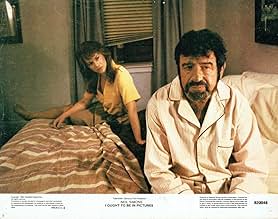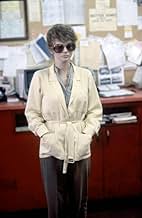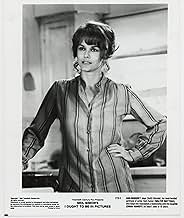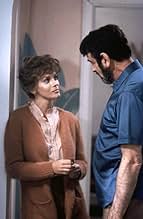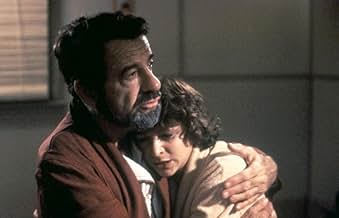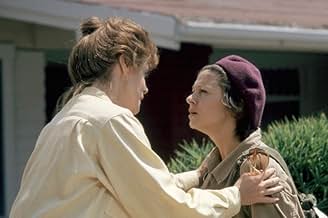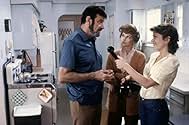AVALIAÇÃO DA IMDb
6,1/10
1,2 mil
SUA AVALIAÇÃO
Adicionar um enredo no seu idiomaBrooklynite Libby Tucker leaves her mother in Brooklyn to visit her screenwriter dad Herbert Tucker in L. A. She hasn't seen him for years and aspires to find a fast-paced life in movies. Al... Ler tudoBrooklynite Libby Tucker leaves her mother in Brooklyn to visit her screenwriter dad Herbert Tucker in L. A. She hasn't seen him for years and aspires to find a fast-paced life in movies. Along the way, Libby discovers who her dad is.Brooklynite Libby Tucker leaves her mother in Brooklyn to visit her screenwriter dad Herbert Tucker in L. A. She hasn't seen him for years and aspires to find a fast-paced life in movies. Along the way, Libby discovers who her dad is.
Avaliações em destaque
I Ought to Be In Pictures was mostly boring. It's about a teenager who goes from New York to Hollywood for acting in the film business and also to be in touch with her dad that she hasn't seen since she was three years old because of a divorce. The relationships weren't anything memorable and there were a few laughs and it kind of ended how it began where not much was accomplished. I was hoping for better because the screenplay is by Neil Simon and the director is Herbert Ross who also directed Simon's The Sunshine Boys with Walter Matthau also in it. Ann-Margret plays Walter's girlfriend and while the performances did their best, the script isn't about much.
It must have been a casting no-brainer to put Dinah Manoff in the film-adaptation of Neil Simon's Broadway hit "I Ought To Be In Pictures" since she played the part of headstrong Libby on the stage. Unfortunately, a bombastic concoction such as Libby cannot be easily transferred to the more intimate medium of film, and the writing leaves both Manoff and the viewer at a complete loss. Neil Simon writes gag-dialogue, gag-characters, gag-situations, so when he tries to get serious--the audience doesn't know how to respond. Is this guy kidding again? Libby moves from Brooklyn to Los Angeles to reconnect with her estranged screenwriter father, ostensibly to break into movies but mostly because she needs a loving dad to hold her. These later scenes are so uncomfortable, so static, that poor Walter Matthau can only sit on the end of the bed and gape (I've never seen him at such a loss). Ann-Margret has a warm, grounded presence as Matthau's girlfriend (it's not much of a role, and the dialogue is still in Simon's one-note, but A-M manages to give this woman some soul). Manoff, looking and acting like a cross between Tatum O'Neal and Kristy McNichol, projects to the rafters, as if she were still on Broadway. She's Gussy Gumshun; and when the barriers come down and she's vulnerable, we would like to give her our sympathies, but Simon won't let us. He has already moved on, to the next limp gag. ** from ****
Wonderful film with Neil Simon again showing that he is the master of writing.
Dinah Manoff is just marvelous as the precocious 19 year old who goes to California to see the dad she hasn't seen in 16 years.
The film is touching as it first shows that Matthau knows so little about his daughter (and son) but then as the film goes on, he shows all the attributes that a father shows.
As Matthau's girlfriend, Ann-Margret is very good. The picture itself provides no screaming of usual Matthau antics. He is genuine here in every sense of the word.
The film shows the strong bond that is formed and we're sorry when Libby takes the bus back to N.Y. At least, there is a commitment by the father to keep in touch.
We also have to wonder what kind of woman he was married to that drove him away years before.
Dinah Manoff is just marvelous as the precocious 19 year old who goes to California to see the dad she hasn't seen in 16 years.
The film is touching as it first shows that Matthau knows so little about his daughter (and son) but then as the film goes on, he shows all the attributes that a father shows.
As Matthau's girlfriend, Ann-Margret is very good. The picture itself provides no screaming of usual Matthau antics. He is genuine here in every sense of the word.
The film shows the strong bond that is formed and we're sorry when Libby takes the bus back to N.Y. At least, there is a commitment by the father to keep in touch.
We also have to wonder what kind of woman he was married to that drove him away years before.
what an outstanding and heart-tugging performance by DINAH. i never miss a rerun and go out of my way to see it. i can't believe she was not nominated for something. a perfect bit of acting by her and WALTER MATHAU. my wife says, "i guess you're.... just in love". the first time i saw the film was totally by accident. i was in a dentist's office for an appointment for teeth cleaning. the movie came on in the waiting room and after it was thirty minutes into filming the nurse came out and said "next". by a stroke of luck it was the last appointment of the day. i asked the dentist, who is also a dear friend, to let me continue watching. well, we both watched. the nurse had gone and he worked on my cleaning himself. he said it was worth it.
Neil Simon's "I Ought to Be in Pictures" is a moving family drama, peppered with the author's patented gag lines and notable for sock performances by Dinah Manoff and Walter Matthau. Affecting, amusing interpersonal relationship pic bodes broad market appeal.,
Nimbly opened out from the 1980 stage version by helmer Herbert Ross (who also staged the play), film concerns a 19-year-old spunky Brooklyn girl Libby (Dinah Manoff reprising her stage role), who hitchhikes to New York to break into films as an actress but more importantly see her dad who left her, a brother and mom for good 16 years earlier. Dad is Herb Tucker (Walter Matthau fitted out with a handsome beard), a once-successful feature and tv scripter now given over to gambling and drinking. Tucker's loyal g.f. Steffie (Ann-Margret) is supportive but has her own children to take care of and a new boyfriend in the wings.
With Libby gradually insinuating herself into Herb's life and gradually reforming him (while cutely refurbishing his house and Mustang car), film gains its force from the powerful interplay of the duo's personalities. When the comical putdowns are replaced by genuine emotional (and physical) contact, Simon achieves his tear-jerking goal.
Key factor in making this work is apt casting, with Manoff, Lee Grant's sprig. Outstanding in avoiding direct sentimentality in the showy central role. She's also a good listener, with her eye contact and support of Matthau key elements. For his part, Matthau makes a ne'er-do-well character immensely sympathetic in spite of his shortcomings, enough so the viewer can root for these two to eventually come together in a loving fashion. Echoing the mother-daughter reconciliation of SImon's recent "Only When I Laugh", it builds to a valid denouement of Matthau geared up to plunge seriously into his writing assignments, and Manoff returning home with her family devils exorcised.
In a much smaller role, a deglamorized Ann-Margret is effective as the selfless mistress, while Martin Ferrero, Lewis Smith and Lance Guest provide a diveting scene apiece opposite Manoff. Tech credits, particularly Albert Brenner's production design and David M. Walsh's lighting, succeed in giving the film a realistic backdrop and avoiding a stagey or studio set look.
My review was written in March 1982 after a Midtown Manhattan screening.
With Libby gradually insinuating herself into Herb's life and gradually reforming him (while cutely refurbishing his house and Mustang car), film gains its force from the powerful interplay of the duo's personalities. When the comical putdowns are replaced by genuine emotional (and physical) contact, Simon achieves his tear-jerking goal.
Key factor in making this work is apt casting, with Manoff, Lee Grant's sprig. Outstanding in avoiding direct sentimentality in the showy central role. She's also a good listener, with her eye contact and support of Matthau key elements. For his part, Matthau makes a ne'er-do-well character immensely sympathetic in spite of his shortcomings, enough so the viewer can root for these two to eventually come together in a loving fashion. Echoing the mother-daughter reconciliation of SImon's recent "Only When I Laugh", it builds to a valid denouement of Matthau geared up to plunge seriously into his writing assignments, and Manoff returning home with her family devils exorcised.
In a much smaller role, a deglamorized Ann-Margret is effective as the selfless mistress, while Martin Ferrero, Lewis Smith and Lance Guest provide a diveting scene apiece opposite Manoff. Tech credits, particularly Albert Brenner's production design and David M. Walsh's lighting, succeed in giving the film a realistic backdrop and avoiding a stagey or studio set look.
My review was written in March 1982 after a Midtown Manhattan screening.
Você sabia?
- CuriosidadesWalter Matthau once said of this movie: "It's filled with very real emotions . . . there were a few seconds while I was acting when I flashed back to my childhood when my father deserted us . . . I was exhausted at the end of each day. Some roles are easier but comedy, such as Neil Simon writes, is twenty times more difficult than straight acting or tragic acting. I prefer the challenge of comedy. It requires a great deal more energy, a great deal of kinetic output."
- Erros de gravaçãoIn the closing scenes Libby is first seen sitting on the left side of the bus talking to her seat mate, then when Herb drives his car up next to the bus on the right side she sees him through the right side window.
- Trilhas sonorasOne Hello
Music & Lyrics by Marvin Hamlisch and Carole Bayer Sager
Sung by Randy Crawford
Produced by Tommy LiPuma
(P) 1982 WEA International Inc.
Principais escolhas
Faça login para avaliar e ver a lista de recomendações personalizadas
- How long is I Ought to Be in Pictures?Fornecido pela Alexa
Detalhes
- Data de lançamento
- País de origem
- Idiomas
- Também conhecido como
- Hollywood, Cheguei!
- Locações de filme
- 6830 Sunset Boulevard, Hollywood, Califórnia, EUA(motel Libby stays at upon arrival in Hollywood)
- Empresa de produção
- Consulte mais créditos da empresa na IMDbPro
Bilheteria
- Orçamento
- US$ 10.500.000 (estimativa)
- Faturamento bruto nos EUA e Canadá
- US$ 6.968.359
- Fim de semana de estreia nos EUA e Canadá
- US$ 2.170.397
- 28 de mar. de 1982
- Faturamento bruto mundial
- US$ 6.968.359
Contribua para esta página
Sugerir uma alteração ou adicionar conteúdo ausente

Principal brecha
By what name was Sonhando com a Fama (1982) officially released in Canada in English?
Responda

